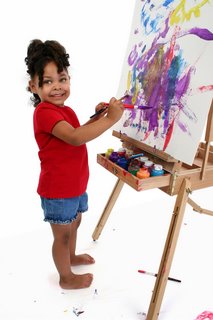Children have enormous potential. There’s almost no limit to the things they can do. One of the wonderful things about the prepared Montessori environment is that it makes every kind of task accessible.  It can be a chore, like sweeping, or a complicated math concept, like the binomial equation; in every case, our goal as educators is to enable the child to do something successfully, with increasing levels of independence.
It can be a chore, like sweeping, or a complicated math concept, like the binomial equation; in every case, our goal as educators is to enable the child to do something successfully, with increasing levels of independence.
Even as we encourage children to try activities in every area of the classroom, we will still see different strengths appear. Some children will naturally excel at math, others at reading, and others at art or music. Watching these natural talents emerge is one of the really fun byproducts of all the observation we do every day.
Several things came to mind while I was thinking about this topic. One was, “Do we encourage the child in areas where he or she is obviously gifted, or do we try to encourage them in areas that take more effort and don’t come as easily?” I think we can do both.
Let me use my son as an example. From a very early age, he has loved to build. His building material of choice is usually Legos, but he will build with blocks, stones, popsicle sticks, or anything else he finds. “Mom”, he often says, “I’m a builder.” And he is. So, we encourage him in this area – we look at books and websites about architecture, we give him interesting building materials to use (Kapla blocks will be next), and admire his various constructions.
He has little interest in drawing and sketching – that’s just never appealed to him. He’d rather build a tower than draw one. Still, we provide him with an art pad, colored pencils, and drawing books so that we can occasionally sit down and draw something. It’s probably not going to ever be his favorite thing to do, but it’s still part of a well-rounded education.
This, I think, is a good approach to any child’s strengths and weaknesses. It’s important to find the things that they’re good at, but they can also be encouraged to grow in other areas as well. Sometimes it takes gentle prodding to get an astronomy-loving child to take a crack at botany classification, or a dancer to try soccer, but it can be done. Trying lots of different activities can also help a child discover new activities that he or she enjoys.
In some cases, activities can be combined. For instance, my son could be encouraged to draw a building, since that’s what he loves. A reluctant reader can be coaxed into looking at books about a favorite subject. A recalcitrant speller can learn to spell words related to a hobby, pet, or other topic they enjoy.
Many children’s gifts are not easily quantifiable. They don’t fall into any curricular or extra-curricular area. For instance, some children are gifted peacemakers. They have a knack for helping others resolve conflict. Others are gifted communicators; they shine when they are telling stories, singing, speaking, or acting. These are also important skills that can be recognized and encouraged.
What about an older child who feels that they don’t have any idea where their gifts lie? This can be trickier, especially if they know someone else who is decidedly gifted in some area. For some children, strengths are obvious very early on. For others, it may take many years before they emerge. Waiting can be difficult.
There are a few ways to determine where a child’s natural abilities lie. Here are some helpful questions that can be asked:
1. What is the child good at?
2. What do they enjoy doing?
3. What sorts of activities do they seek out on a regular basis?
4. What kinds of things do people compliment them on?
5. When do they seem most fulfilled by the work they’ve done?
6. Do other children seek them out for help in a certain area?
Spending some time just observing, with these questions in mind, can be very beneficial. If the child is old enough, they can be included in this process, and contribute their own answers to the above questions. Parents and teachers can share observations to get a better overall picture of the child’s natural inclinations. The child’s natural temperament may play a role, too, so be sure to evaluate their preferred learning style.
Many of us have regrets as we look back at missed opportunities. Perhaps no one encouraged us in our strong areas, or maybe there was an area that didn’t come naturally to us but we wish we had tried harder. Carefully observing the children in our care can help them to avoid these same pitfalls. When we look closely, we will see that every child is gifted – and our encouragement can be the gift they need to reach their potential.

